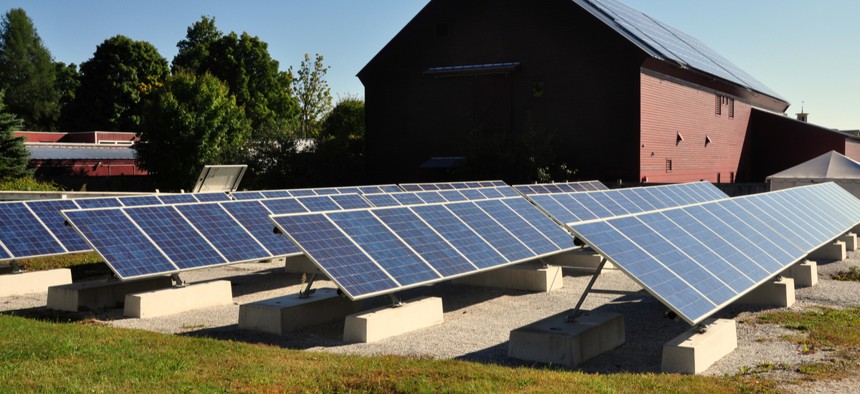Connecting state and local government leaders
Projects are already appearing in Massachusetts independent of the state’s grant program.
Massachusetts is trying to kickstart a homegrown energy storage industry right now, capitalizing on the state’s ongoing investments in solar and wind power. Earlier this year, the Department of Energy Resources began spending $20 million to cover up to half the costs for 26 projects, ranging from a Martha’s Vineyard Transit Authority backup battery for a new fleet of e-buses to a much larger solar-plus-storage facility in the Acton-Boxborough school district.
The Advancing Commonwealth Energy Storage initiative, or ACES, comes as the Bay State looks ahead to the retirement of the Pilgrim nuclear station next year, and, as energy demand remains firm on the back of a robust, regional economy. Participation in the program has been strong. “We were originally going to design it as a $10 million program but doubled that to $20 million,” says Judith Judson, DOER commissioner. “And yes, we are definitely looking at storage to deal with retirements, but also, as a way to handle the rise of intermittent power.”
Energy storage is a leading edge technology that's just now beginning to gain traction. More than just a simple box, however, storage is increasingly paired with software to create an “intelligent layer” across various grid interactions. EV charging companies are starting to allow limited interoperability between the grid and EV batteries, while large utilities are experimenting with storage as a way to smooth out spikes and drops, some which last only seconds. Overall, storage is shaping up to be a money saver, and a smart third-party player wherever electricity flows.
Among a handful of eastern states that are rapidly adopting adopting wind and solar, Massachusetts is now the sixth-largest producer of solar power in the country, just behind Texas and Nevada. Data from the Energy Information Administration additionally shows that combined solar and wind so far, in 2018, are already providing over 7 percent of the state’s demand for electricity. Massachusetts is primarily a rising star in solar power, but will soon embrace wind power too, as a collection of eastern states, from Delaware and Maryland to New York and Rhode Island, get into the offshore wind power game.
This fall, Massachusetts took a great leap forward in this regard, signing a deal for the massive offshore 800 MW Vineyard Wind project, which begins construction next year. As intermittent resources grow, the need will increase to store daytime solar for evening use, and nighttime wind for the following day.

While Rhode Island was the first state in the country to build an offshore facility, Block Island Wind, at 30 MW of capacity, the state of Massachusetts passed legislation this summer for 10 times that amount, doubling its own mandate to 3200 MW of offshore wind by 2035. That pipeline, combined with other state mandates, will provide both the demand, but also the needed visibility, to a nascent energy-storage industry.
But time-shifting of surplus wind and solar is not the only solution that storage can undertake. Ben Serrurier, policy manager for western states at Cypress Creek Renewables, a solar developer based in San Francisco, told Route Fifty that “the number one benefit we see to energy storage, for cooperatives and public owned utilities in particular, is investment deferral.”
In other words, energy storage, at the margin, can be a way to delay building new power plants, or avoid new sub-stations in highly dense areas, where public push-back against new large infrastructure can be strong. “Let’s say in the years ahead you have adoption of electric buses in a city like Seattle, with a concurrent increase in demand,” Serrurier says. “Well, there are a couple of ways to address this, like new transmission, or, you could simply tack on batteries.”
Serrurier points out “while more wires will surely have to be built” as the electricity system grows, avoiding unnecessary expenditures on transmission is an efficiency goal that aligns well with the public. Moreover, once installed, batteries act as a two-way intermediary, providing both supply, and demand.
Public opposition to new power generation, of any kind, has been strong in recent years and it’s been difficult both in Massachusetts and in New England more generally. A mega-project designed to bring clean hydropower from Canada, Northern Pass, was rejected earlier this year, mostly due to the need for large transmission wires.
Tightening supply further, a wave of coal retirements has also been seen in the region in addition to the imminent loss of Pilgrim Nuclear—which is still providing about 8 percent of Massachusetts’ electricity demand. Accordingly, the state has a peak-demand problem that drives up prices and creates strains on the system. And, interestingly, energy storage can play a third role, helping to dampen the price spikes during peak.
“The one statistic we talk about is that our top 1 percent of hours uses 8 percent of electricity spending, and the top 10 percent of hours accounts for 40 percent of electricity spending,” says commissioner Judson. “In addition,” she says, “at peak, the bid stack gets dirty.”
Judson further explained that the administration of Gov. Charlie Baker, understanding that dirtier resources come into the system during peak, adopted a new Clean Peak Standard in the same energy bill that raised windpower goals, this summer.
Storage projects are already appearing in Massachusetts independent of the state’s grant program. Hampshire College, partnering with Solar City, a division of Tesla, has now put into operation a very large 4.7 MW solar array across a 19 acre piece of land on the south side of its campus in Amherst. Paired with a fixed-site battery, the combined system allows the college to both generate and transmit electricity back to the grid, or take power from the grid, depending on usage patterns.
According to published reports, the college as a result has secured for itself power rates that are far below market prices. But more important still is that investments like these impact not just a single institutional user, but the system itself. Storage increasingly looks to play several roles, though as Serrurier points out, not necessarily many roles all at once.
“While battery storage can provided everything from time-shifting to frequency regulation, it’s not likely to do both,” he said. “The behavior of the battery is going to really align with its purpose. So it’s best to think about how a particular project may be focused.”
This all said, the Baker administration in Massachusetts may have hit upon a clever, near-term solution in energy storage, one that navigates through the tight interplay of rising renewable generation and a public that is averse to new wires and typically massive power projects. “With storage,” says Judson, “we can definitely reduce our spending on energy infrastructure. Storage is a game changer.”
Gregor Macdonald is a journalist who regularly covers cities, climate and energy. He is based in Portland, Oregon.

NEXT STORY: Can common sense be built into AI?



